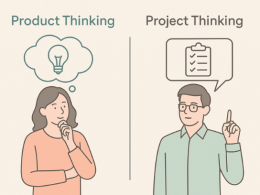If you’re working in the supply chain industry and considering a career transition to product management, you’re not alone. Many professionals with a background in supply chain find themselves drawn to the exciting world of product management, where they can contribute their skills and expertise in new and innovative ways.
However, making this transition can be challenging, as Product Management requires a different set of skills and responsibilities. But fear not!
Navigating the Transition from Supply Chain to Product Management
In this Accredian blog, we’ll explore some valuable insights and practical tips to help you successfully navigate the journey from a supply chain background to product management.
1. Understand the Role of Product Management
Product Management is a strategic function that involves overseeing the entire lifecycle of a product, from concept to launch and beyond.
Product managers are responsible for market research, product development, pricing, positioning, and marketing strategies, as well as managing cross-functional teams, driving product roadmap, and making strategic decisions to achieve business goals.
Understanding the core responsibilities of product management is crucial in preparing for the transition.
2. Highlight Transferable Skills
While Product Management may seem like a different realm from supply chain, there are numerous transferable skills that can make your transition smoother.
For instance, skills such as data analysis, project management, negotiation, and vendor management that you’ve developed in the supply chain can be assets in product management.
Highlight these skills in your resume, cover letter, and interviews to showcase how your supply chain background can benefit the product management role.
3. Fill the Gaps in Your Knowledge
Although you may possess relevant skills from your supply chain background, there might be areas where you need to bridge the knowledge gap.
Take the time to understand the product development process, market research techniques, pricing strategies, and other aspects of product management.
There are numerous online resources, courses, and certifications available that can help you gain the necessary knowledge and skills to excel in your new role. Join Accredian here.

4. Network and Build Relationships
Networking is crucial in any career transition, and it can be especially beneficial when moving from supply chain to product management.
Attend industry events, join relevant professional organizations, and connect with product managers in your network to learn from their experiences and gain insights into the field.
Building relationships with product management professionals can open doors to opportunities and provide valuable guidance as you navigate your career transition.
5. Be Proactive and Seek Opportunities
Transitioning into a new field may require you to be proactive and actively seek opportunities.
Look for ways to gain hands-on experience in Product Management, such as taking on internal projects, volunteering for cross-functional initiatives, or offering to assist product managers in your organization.
This can help you showcase your skills and demonstrate your commitment to transitioning into the role.
6. Tailor Your Resume and Cover Letter
When applying for Product Management roles, it’s important to tailor your resume and cover letter to highlight how your supply chain background aligns with the requirements of the role.
Emphasize your relevant skills, achievements, and experiences that demonstrate your potential as a product manager.
Use quantifiable results and specific examples to illustrate your impact and contributions in your supply chain roles.
7. Ace the Interview
Preparing for Product Management interviews is crucial for a successful transition. Research the company, the product(s) they offer, and their competitors.
Be ready to answer behavioral and situational questions that assess your problem-solving, decision-making, and leadership skills.
Be prepared to discuss how your supply chain experience can be applied to product management and how you can contribute to the company’s product strategy and goals.

8. Emphasize Your Value Proposition
As a candidate transitioning from a supply chain background, it’s important to highlight the unique value proposition you bring to the product management role.
Your experience in supply chain can provide you with insights into the end-to-end supply chain processes, understanding of logistics, procurement, and inventory management, which can be valuable in optimizing the product development and launch process.
Emphasize how your supply chain expertise can contribute to efficient supply chain management, cost optimization, and risk mitigation in product management, ultimately driving profitability and customer satisfaction.
9. Demonstrate Adaptability and Learning Agility
Transitioning from a supply chain background to product management may require you to adapt to a new set of responsibilities, processes, and stakeholders.
Highlight your adaptability and learning agility in your resume, cover letter, and interviews. Showcase examples of how you’ve successfully adapted to new situations in your supply chain roles and how you’ve continuously learned and grown professionally.
This demonstrates your ability to quickly learn and apply new skills, a critical trait in product management where the market and customer needs are constantly evolving.
10. Showcase Your Passion for Products
Product management is a role that requires a deep passion for understanding customer needs, identifying market opportunities, and driving product innovation.
Highlight your genuine interest in products, technologies, and consumer trends in your application materials and interviews.
Share your ideas and perspectives on product development, product strategy, and market trends to showcase your enthusiasm for the field.
11. Seek Mentorship and Guidance
Transitioning to a new career field can be overwhelming, and having a mentor or seeking guidance from experienced product managers can be immensely beneficial.
Look for opportunities to connect with product management professionals who can provide guidance, advice, and insights into the field.
Their mentorship can help you navigate challenges, gain industry knowledge, and accelerate your career transition.

12. Be Persistent and Patient
Transitioning to product management from a supply chain background may not happen overnight. It requires persistence, patience, and perseverance. Be prepared to face challenges and setbacks along the way, but don’t give up.
Keep refining your skills, networking, and seeking opportunities. Stay committed to your career transition and remain patient as you navigate the job market and interview processes.
Transitioning from a supply chain background to product management can be a rewarding career move. By understanding the role of product management, highlighting transferable skills, filling knowledge gaps, networking, tailoring your application materials, showcasing your value proposition, demonstrating adaptability, and seeking mentorship, you can successfully navigate the transition.
Remember to be persistent, patient, and proactive in your career transition journey. With the right mindset, preparation, and determination, you can successfully make the leap into a fulfilling career in product management. Best of luck on your career transition!
Seeking a thrilling career in Product Management? IIM-V’s Product Management certification is your perfect launchpad! Our comprehensive course is designed to ignite your passion for products and arm you with the skills to excel in this dynamic field.
Don’t wait, take the leap with Accredian and unlock boundless opportunities in the world of product management!
Explore our insightful blog page today and unleash your potential in the exhilarating world of product management!






